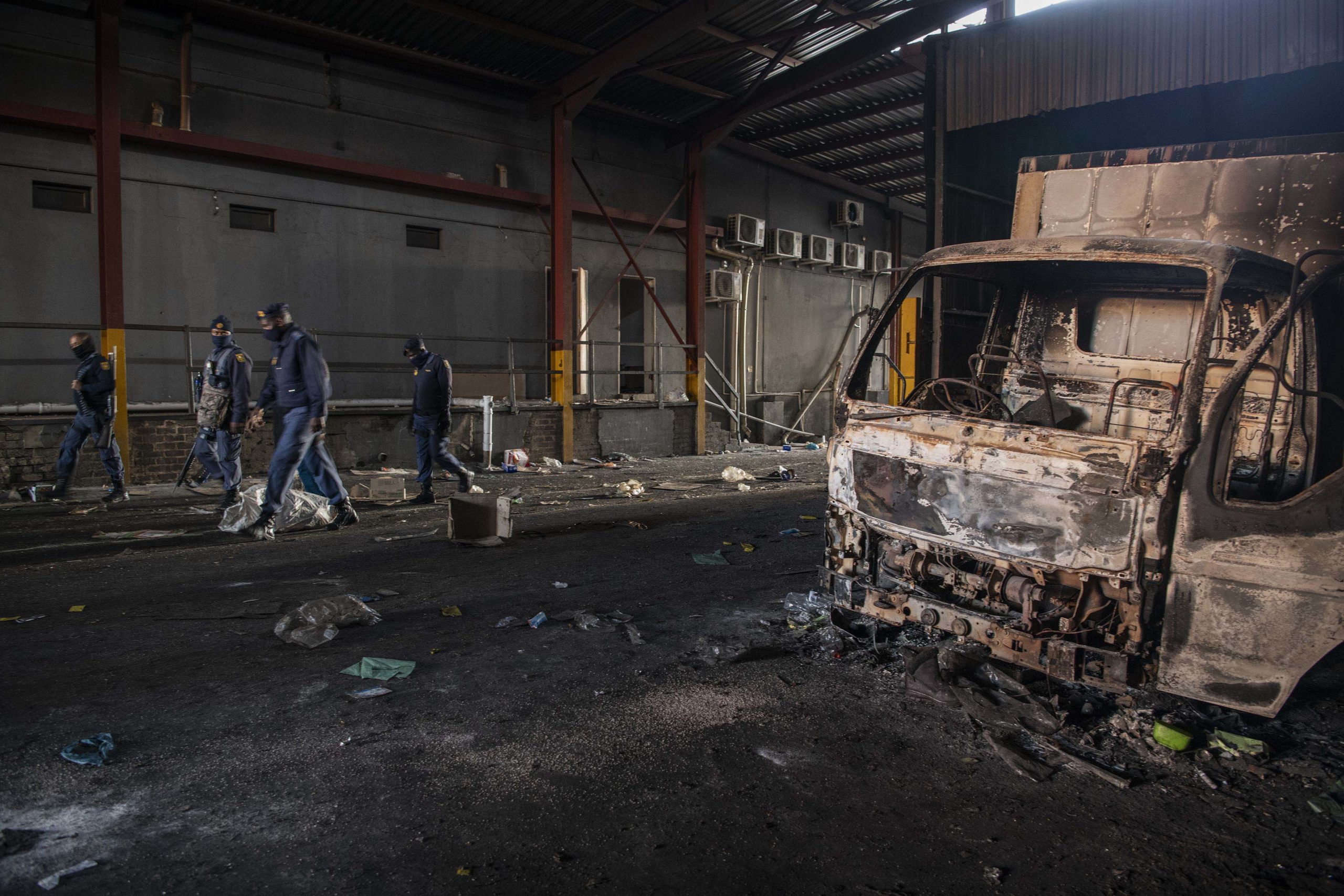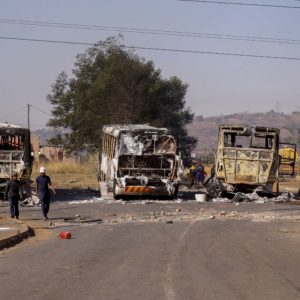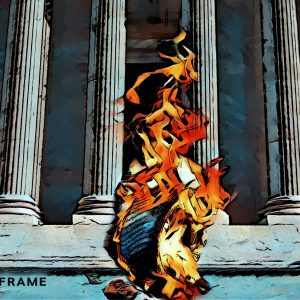No trucks, no supplies is the harsh SA reality
The burning of cargo trucks in KwaZulu-Natal just days before riots broke out appears to be an act of sabotage in a coordinated effort to stop essential supplies from reaching people.
Author:
15 July 2021

As of Tuesday 13 July, 35 cargo trucks had been torched in KwaZulu-Natal and parts of Gauteng amid the largest riots in South African history.
The burning of these cargo trucks began as supporters of former president Jacob Zuma called for a total shutdown of KwaZulu-Natal, in opposition to his 15-month incarceration for contempt.
Truck drivers and owners said heavily armed and masked individuals hijacked trucks near the Mooi River Toll plaza and used them to block the road before torching 25 of them, including one carrying luxury vehicles destined for export at the Durban port. Later, groups of mainly young rioters used burning tyres and logs to block roads.
The Mooi River toll plaza is on the N3 that links the Durban port to the economic powerhouse of Gauteng. Parts of the highway are still closed indefinitely as a result of the torched trucks.
Related article:
Road Freight Association chief executive Gavin Kelly said these attacks are the latest in a series on the freight industry. He said rioters and looters are targeting trucks because it is easy to intimidate drivers and hijack their vehicles to block the road or set them alight.
Our roads carry 80% of South Africa’s goods, he said. “Simply put, when trucks stop, South Africa stops. The consumer will foot the bill for what has happened, through both indirect charges relating to the cost of logistics, the need to build reserves to repair damaged infrastructure and as goods become scarce. Supply and demand will dictate cost, and if supply cannot meet demand, demand will drive prices up.
“The cost to operational assets [vehicles and infrastructure] is just the tip of the iceberg, and as reports come in, this will grow exponentially. We are already looking at billions of rands in the total logistics supply chain, without factoring in the damages to commercial retail space,” Kelly said.
Not the first truck attacks
The recent torchings of cargo trucks followed the same modus operandi as the violent torching of trucks allegedly carried out by supporters of the All Truck Drivers Foundation (ATDF).
The ATDF openly spits xenophobic bile and has been accused of countless acts of violence and attacks on migrant drivers and trucks.
Prior to the attacks on 10 July, more than 1 400 trucks had been burnt or looted on South Africa’s roads since 2019. Most of these attacks are associated with the ATDF and its campaign to “chase away foreign drivers from our roads”.
Related article:
David Tembe, a 43-year-old truck driver, said he was en route from Bergville to Durban when the torching happened. He said his truck was one of those lucky enough not to be torched, but he witnessed the attacks.
“We saw the drivers fleeing with their belongings. They were traumatised … They told us they had been hijacked by unknown men carrying heavy artillery firearms.
“We could see the flames and smoke from afar. We had to wait throughout the night without any police presence. I was in the traffic from 7pm and we were only able to move away at about 8am after the rubble had been cleared away from part of the highway.”
‘What will our children eat?’
Vusimuzi Mkhize, a 54-year-old father of four who works as a truck driver for a Durban-based company with a more than 100-strong fleet, said he is worried about his job. His bosses have pulled all their trucks from South Africa’s roads until further notice, after one of them was torched near the Mooi River toll plaza.
“They said they have been losing trucks during other violent protests and they cannot take any more risk. This is painful because we are losing our income and we could permanently lose our jobs for a cause that we have little to do with. If people are toyi-toying, why must they burn trucks, why must they loot?
“This country is going down because of these people. What will we eat? What will our children eat… Jacob Zuma?” he asked.
Related article:
The effect of the torching is already being felt in the freight industry. Many truck drivers and owners whose vehicles were torched on the N3 in Mooi River, KwaZulu-Natal, are blaming the government for not being proactive in preventing the attacks and damage.
The Mooi River toll plaza has experienced truck torchings on a large and small scale for the past few years but government agencies have done nothing to ensure that it is well guarded, said one Black trucking operator. He runs a small company with several trucks, one of which was burnt during the recent attacks. He asked that his name be withheld for fear of retribution.
“This is a huge loss to us as a small but growing logistics businessman. It is also a loss to the economy of South Africa. I will now have to retrench my staff and many other truck owners I have spoken to are going to have to let their staff go because of this.
“All of this is done by senseless people and our government is not doing enough because, clearly, everyone knows that Mooi River toll plaza is the biggest threat and hotspots in the Durban and Johannesburg route. But they have done nothing and trucks are soft targets,” he said.
Adding to the trauma
Trade unions are also worried about a job bloodbath in the industry.
Democratised Transport Logistics and Allied Workers’ Union (Detawu) general secretary Vusi Ntshangase condemned the attacks on trucks by those advancing a political agenda. He said these acts of “criminality also place workers’ safety and their employment at risk and will undoubtedly affect their already strained mental health due to trauma suffered in previous torchings.
“It is rather unfortunate that this latest event has exposed the ineffectiveness of the country’s intelligence services as it failed to detect and arrest this obviously coordinated criminal act.
“Detawu is not convinced that the police are systematically and strategically placed to respond effectively to this event, because although it is currently localised in KwaZulu-Natal province and parts of Gauteng, it should not be underestimated as it has the potential to overlap to other provinces. We have to stamp out this lawlessness before it spreads further.”
Related article:
Migrant truck drivers say they fear that these incidents will lead not only to job losses but also to further polarisation of the relationship between South African and migrant drivers.
Charles Mabiko, a 46-year-old driver who was born in Zimbabwe, nearly died when angry, anti-migrant drivers and rioters attacked him in Upington, Northern Cape, in June last year.
“We are worried about what will happen to our jobs. But we also fear that our fellow drivers would now blame us for the job losses. Things are going to get even tougher for us,” he said.
Many other truck operators said they were still counting the cost of the torchings and looting of the past few days. But they were all certain that it will take many years for the affected areas and the country to recover from the recent unrest – if ever.




